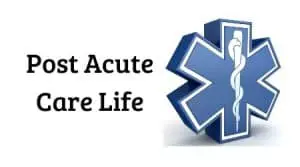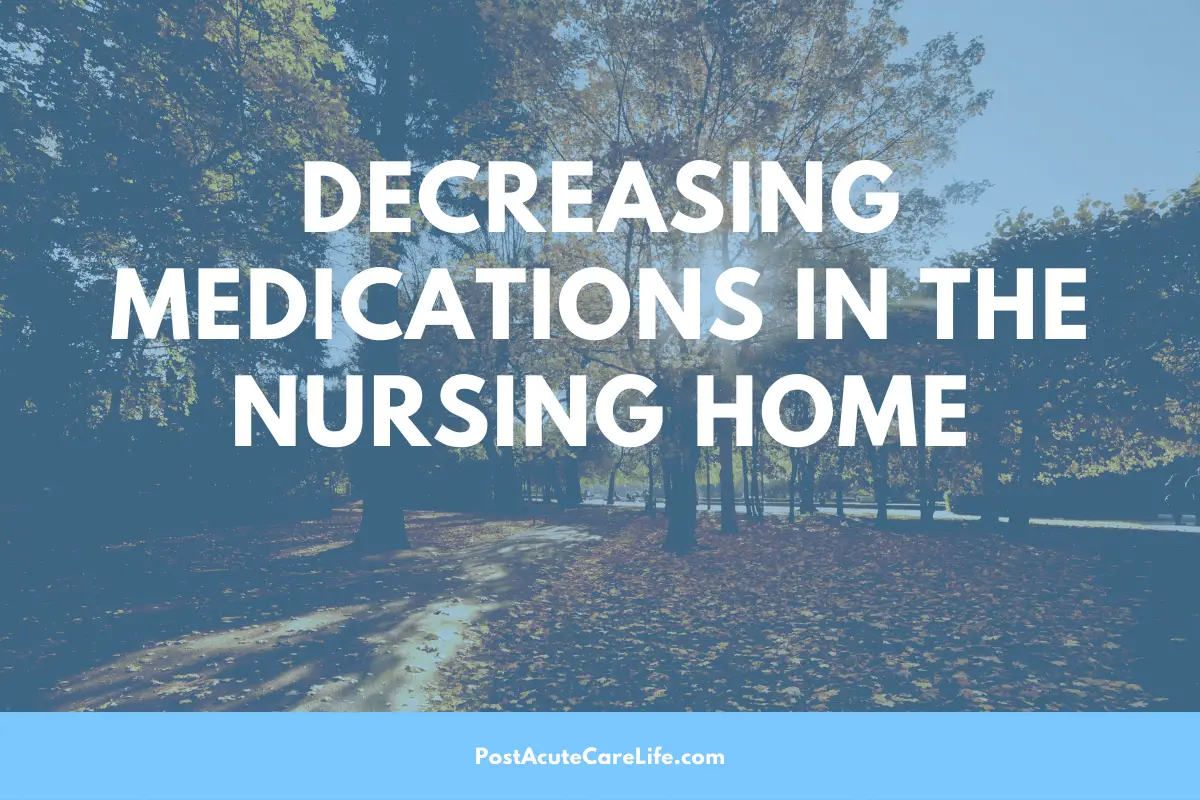Some statistics say the average medication pass in nursing homes involves 73 medications. This number is the responsibility of the doctor and nurse practitioner to manage and reduce when possible.
Polypharmacy is the use of multiple medications by patients and usually ranges from 5 to 12 medications. Polypharmacy has been independently associated with an increased risk for an adverse drug event (ADE), and an increased risk of hospital admission.
What to look for when doing a medication review?
- Is the medication prescribed backed by evidenced-based research?
- Are there any allergies to the medication?
- Dosing of the medication at the right dose? Subtherapeutic or supratherapeutic dosing?
- Any documented adverse reactions to the medications by staff
- Is the drug effective?
- Is there any duplicate therapy? Could one of the medications be stopped?
- Drug interactions with other prescribed medications?
You will need to look at the entire picture and for what they are being treated. You’re not just looking at the disease state; you are looking at the total body.
When performing a medication review, make sure to make a comparison of past and present medications.
Comparing past and present medications is especially important when the resident is being readmitted to the nursing home.
Perform a thorough review of all medications the patient will be taking while at the facility. While doing this, you want to look for adverse reactions to other medicines, natural products (vitamins homeopathic, herbal products), and OTC medications.
Many patients do not realize there can be interactions between their medications and over the counter preparations. It is our job as providers to look for these interactions and make changes when needed.
Was the patient previously on a statin? Why was the medication discontinued? If the change in medications is an improvement in medication regimen, then document and move on.
However, if the patient would benefit from not prescribing the medication, it is ok to get rid of the medicine.
There have been studies that showed that after a medication reduction, only 10% of the population required the medications to be reinstated.
Now is the time to attempt to reduce the medication burden the patient may experience. Focus your attention on lowering protein pump inhibitors, statins, pain medications, benzodiazepines, antipsychotics, and over the counter medications.
Here is a link to some of the most common medications in nursing homes.
Clinically significant Medication issues
The nurses in the homes are required to report any clinically significant medication issues to a medical provider. Medication issues include changes to the patient’s physical, mental, and psychosocial wellbeing.
If there are any adverse changes after taking the medication, the nurse reports to the provider. Some action must be taken by the provider but this doesn’t mean that the drug will be discontinued. However, it could result in a dose reduction or some other change.
With the PDPM payment model, the facilities must report these changes by midnight of the next calendar day. However, we hope the nursing staff would report adverse reactions sooner so that corrective action can be taken.
When you receive these updates of adverse wellbeing, you should use this as an opportunity to reduce medications. The medications the patient prescribed is often a cause of the adverse reactions they may be having.
Communication between provider
When performing the medication review, if the attending or nurse practitioner identifies issues with medications prescribed by a specialist, they are required to correct the medication. Communication can be done by updating the specialist via:
- Phone
- Fax
- Secure email
- HIPPA compliant text
Care should be taken so that the patient doesn’t receive a harmful medication before clarification of the prescription. Either place the medication on hold or discontinue the medication while waiting on the correction of drugs.
If having a delay in medication would cause harm, then determine whether to continue the drug while waiting or consult another medical professional.
There are ways to improve communication in the nursing home. Here is a link to an article discussing how to improve communication between nurses, doctors, physician assistants, and advanced nurse practitioners.
Factors to consider with medications in the elderly
- A proportional increase in body fat relative to skeletal muscle with aging
- Decreased drug clearance may result from the natural decline in renal function with age
- Increasing age may result in an increased sensitivity to the effects of certain drugs
- Hepatic function declines with advancing age. Age-related changes in hepatic function may result in variability in drug metabolism
- Use of herbal or dietary supplements has increased in the elderly
Medication reduction to improve nursing med pass
Not only are all the meds potentially harmful to the patient, but they are also labor-intensive for the nurses in the facility. There may be opportunities when making dose reductions to improve the nursing pass.
Some ways to improve the med pass for the nurses include:
- Avoid ordering medications that are given during mealtimes
- Try to utilize once-daily dosing of medications when possible.
- Eliminate all the long-term vitamins like multivitamins, zinc, and vitamin C. There are medically necessary vitamins such as vitamins D and B12. Still, you should test the levels for these vitamins to see if they are required.
- Discontinue meds that are not needed. By making medication reductions for your residents, you not only help your patient, but you will also improve the day of your nurses in the facilities.
- Try not to order medications at specific times. Writing timing such as “BID or QD.” This will allow the nurse to schedule the times of the medicines to be administered at appropriate times. This doesn’t apply to medications that need to be separated by a certain number of hours like antibiotics. Also, if you know that prescribing at a particular time will benefit the nurse or patient, then write the time.
- Try to consolidate medication passes so that medications are given together during the same medication pass. However, show caution with patients that have difficulty with a more substantial pill burden.
- If you can eliminate the 5 pm medication time, it will improve the speed of the nurses to administer medications. They won’t have to interrupt the mealtimes of the resident.
- Identify medications that are being inappropriately dosed more or less frequently like Lantus and combine them into once-daily dosing. Another common mistake is metoprolol tartrate vs. succinate, which is commonly inputted incorrectly in the medical record. If possible, change the tartrate to succinate to allow for once-daily dosing.
- Change PRN medications to scheduled when the patient is utilizing the drugs regularly. For example, if a patient takes the same pain medication every night at 8 pm, then record the medication for that time. You can schedule follow-ups in the future to see if this medication can be discontinued or the dose reduced.
- Incorporate the nurses in the process of medication reductions. Ask them to identify patients who may have QID blood sugar checks with insulin coverage. If they are controlled or even if they are running high consistently, ask the nurses to identify them so that you can change the insulin doses as appropriate.
Psychotropic drugs
“Antipsychotics have only limited efficacy for treatment of neuropsychiatric symptoms in patients with dementia but are associated with considerable side effects such as accelerated cognitive decline, risk of stroke, and death.”
There are currently goals to reduce off-label use of antipsychotics in nursing homes. One way to reduce their use is to communicate with the nurses to identify opportunities for reduction. Are the patients showing benefits or negatives from being on these medications?
Gradual dose reductions must be attempted on all residents taking antipsychotics. When new patients arrive at the nursing home, you should analyze the need for these medications.
Work with the psych APRN in the facility or facility psychiatrist when ordering dose reductions. When possible, let them handle the reduction in medications. If they are not performing the modifications, care should be taken to reduce medications when possible.
One of the most important things to aid in the effectiveness of reducing antipsychotic use was the education of staff at every level of the organization.
Barriers to medication reduction initiatives
- Family resistance to recommendations to reduce or D/C medications
- Aversion of staff to get rid of or reduce medications
- Lack of effectiveness and/or lack of staff resources
- Worries about the return of symptoms or behaviors
- Lack of nonpharmacological management strategies
Certain medications have a perceived value to the nursing home. For instance, the use of antipsychotics may temporarily sedate patients. However, the increased risks of falls and cognitive decline can outweigh their benefits. Dosing reductions of antipsychotics may result in more work for the staff.
Families will need education regarding the risks of certain medications and their long-term use. By educating the family that a PPI can be harmful if used for extended periods may allow them to process the benefit to the resident.
Staff and families may worry that reducing diabetic medications or antihypertensives will result in adverse reactions. They need to be educated about the risks of certain medicines outweighing the benefit. Drugs like glipizide have increased the chance of hypoglycemia, and beta-blockers have side effect profiles as well.
Conclusion
Medication reduction is made for the safety of the residents and the improvement of medication med pass for the nurses in the nursing home. There will be many opportunities for medication reduction.
You should always be looking for ways to reduce medications when appropriate. When patients arrive at the facility, sick visits, annual exams, 60-day regulatory visits, and discharge visits should all time to review medications.
Medication reduction is a team effort and should be something that all medical providers work towards. It is for the safety of the residents and improvement in their health.
References
Barbara Frank. Reducing Medications: Saving Time and Improving Care. 2006http://healthinsight.org/Internal/assets/Nursing%20Home/MEDMGMT%20-%20Reducing%20Medications.pdf Retrieved October 25, 2019
J. Lazare. Reducing the Use of Antipsychotics in Nursing Home Patients With Dementia. https://www.todaysgeriatricmedicine.com/enewsletter/enews_0116_01.shtml Retrieved October 27, 2019
Tan JL, Eastment JG, Poudel A, Hubbard RE. (2015). Age-Related Changes in Hepatic Function: An Update on Implications for Drug Therapy. Centre for Research in Geriatric Medicine, School of Medicine, The University of Queensland, Princess Alexandra Hospital
Wimmer BC, Cross AJ, Jokanovic N, Wiese MD, George J, Johnell K, Diug B, Bell JS. Clinical Outcomes Associated with Medication Regimen Complexity in Older People: A Systematic Review. J Am Geriatr Soc. 2017;65(4):747. Epub 2016 December 19.


